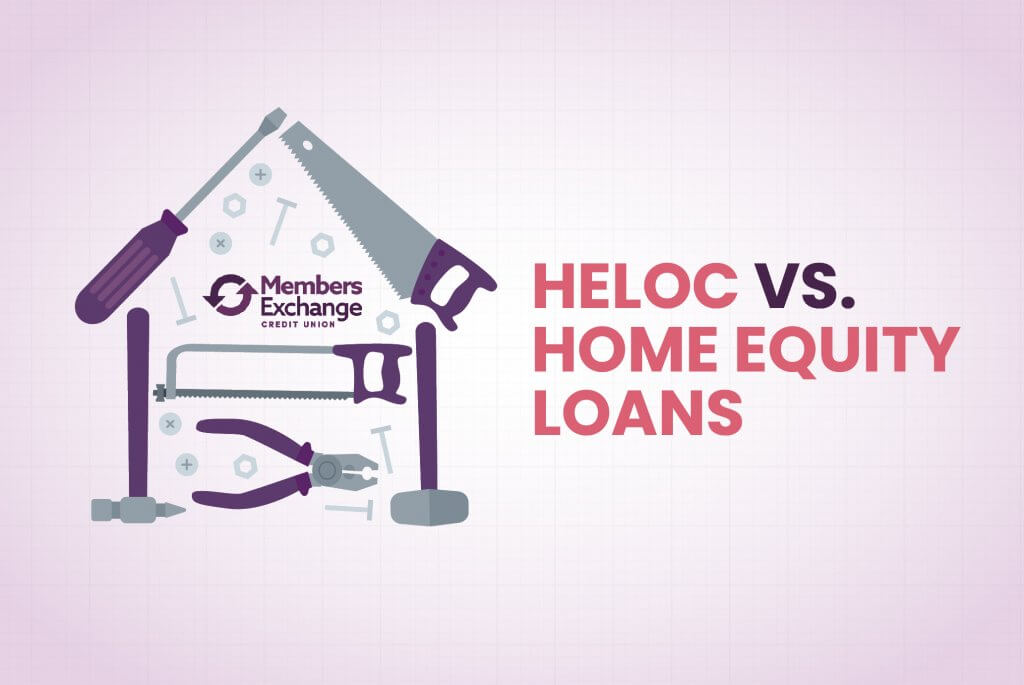Have you been considering taking out an additional loan on your home but aren’t sure which option is right for you? While there are advantages and disadvantages to both home equity loans and a home equity line of credit, it’s important to take into consideration the specific financial need you are trying to fulfill. When it comes to deciding between a HELOC or home equity line of credit, Members Exchange Credit Union is here to give you the facts you’ll need to decide.
A home equity loan will allow you to borrow a lump sum of money against your home, which may be ideal for one-time projects that require a larger investment. Home equity loans also come with a fixed interest rate that you must pay over time. To determine which option is best for you, let’s take a look at why you should or should not apply for a HELOC.
What is a HELOC?
While home equity loans and home equity lines of credit are similar in that you are borrowing against your home’s equity, a HELOC will allow you to borrow over time, rather than a lump sum. Once you qualify to borrow a certain amount, you can take what you need, as needed – and you’ll only pay interest on what you borrow. Interest rates vary depending on your credit profile.
A HELOC is essentially a second mortgage on your home; whereas, you can access cash based on its value. If you own your home outright, you can also qualify for a HELOC which would act as your primary mortgage.
Reasons to Get a Home Equity Line of Credit
There are several instances where a home equity line of credit may be the best option for you. HELOCs are often used for home repairs or renovations not covered by your insurance company. Smaller home projects like a bathroom remodel, garage door replacement, new deck, or major kitchen remodel are all common examples of smart uses for your home equity line of credit.
Other pros to using your home’s equity for home improvement projects are:
- Tax deduction: Interest paid on HELOCs is tax-deductible if the borrowed amount is used on repairs, renovations, or other additions to the home that improves its value. Adding an energy-efficient solar panel to your roof? Sustainable home improvements also qualify as tax-deductible incentives.
- Lower interest rates: HELOCs are designed to improve the value of your home and thus accompany lower interest rates due to the nature of their use.
- Return on Investment: When you’re looking to sell, home improvements can make or break a buying decision. Investing in small home improvements can be a smart way to not only improve your home’s value but also ensure it attracts a larger pool of buyers.
Do I Qualify for a HELOC?
First, to qualify for home equity financing, you need to have equity in your home, meaning the amount you owe must be less than the value of your home. Typically, a home equity line of credit will allow you to borrow 85% of the value of the home minus the amount you owe. While lender requirements vary, here are some general prerequisites:
- A debt-to-income ratio that’s 40% or less
- A credit score of 620 or higher
- Good payment history
- Home value at 15% more than what you owe
What are Some of the Disadvantages of HELOC?
Much like any loan, the main disadvantage of borrowing money against your home is the threat of foreclosure if you are unable to make payments. To avoid being “underwater” on your home, keep in mind the following:
- Ensure your income is stable. It’s important to factor in your HELOC payments before applying for a loan. If your income fluctuates or the amount you need to borrow is minimal, it may be better to apply for a low-interest loan or credit card.
- Prepare for upfront costs. It is not uncommon for a HELOC to require an application fee, title search, attorney’s fees, or home appraisal. Upfront costs can be a pain, so be sure to factor this into your decision.
- Take into account variable interest rates. It’s important to take into account the “periodic cap” and “lifetime cap” of your loan. This determines how your interest rate fluctuates periodically and how high your interest rate may rise during the lifetime of your loan. If your lifetime cap is too high for your financial situation, it may be wise to discuss other options.
- Avoid using your HELOC for basic needs. Getting your finances in good shape is important before applying for another line of credit. While a home equity line of credit can be used for a variety of needs, applying day-to-day expenses to an existing line of credit or lower interest rate card with high rewards will benefit you in the long run. If your balance is too high, consider applying for a balance transfer credit card to help you start tackling debt.
Apply for a Home Equity Line of Credit with Members Exchange Credit Union
Whether it’s a home repair, a family vacation, or help paying educational expenses, Members Exchange can help you achieve your financial goals with a home equity line of credit. Apply for a HELOC today and receive a discounted rate for the first six months, convenient check writing, and interest-only payment options for qualified lines. Not only do we offer amazing interest rates, but for a limited time only, MECU will pay up to $1000 in closing costs! Join our Members Exchange family and learn more about our home loans today.










